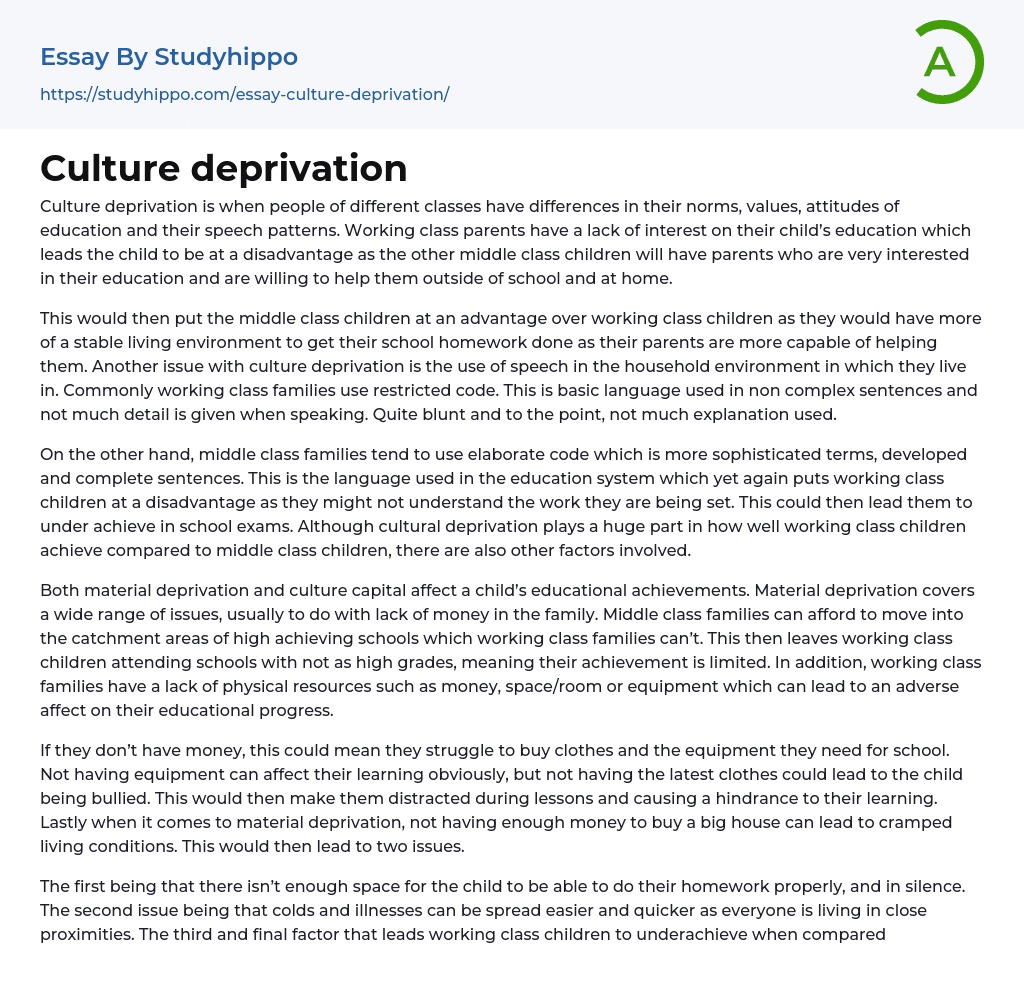Culture deprivation is when people of different classes have differences in their norms, values, attitudes of education and their speech patterns. Working class parents have a lack of interest on their child’s education which leads the child to be at a disadvantage as the other middle class children will have parents who are very interested in their education and are willing to help them outside of school and at home.
This would then put the middle class children at an advantage over working class children as they would have more of a stable living environment to get their school homework done as their parents are more capable of helping them. Another issue with culture deprivation is the use of speech in the household environment in which they live in. Commonly working class families use restricted code. This is bas
...ic language used in non complex sentences and not much detail is given when speaking. Quite blunt and to the point, not much explanation used.
On the other hand, middle class families tend to use elaborate code which is more sophisticated terms, developed and complete sentences. This is the language used in the education system which yet again puts working class children at a disadvantage as they might not understand the work they are being set. This could then lead them to under achieve in school exams. Although cultural deprivation plays a huge part in how well working class children achieve compared to middle class children, there are also other factors involved.
Both material deprivation and culture capital affect a child’s educational achievements. Material deprivation covers a wide range of issues, usually
to do with lack of money in the family. Middle class families can afford to move into the catchment areas of high achieving schools which working class families can’t. This then leaves working class children attending schools with not as high grades, meaning their achievement is limited. In addition, working class families have a lack of physical resources such as money, space/room or equipment which can lead to an adverse affect on their educational progress.
If they don’t have money, this could mean they struggle to buy clothes and the equipment they need for school. Not having equipment can affect their learning obviously, but not having the latest clothes could lead to the child being bullied. This would then make them distracted during lessons and causing a hindrance to their learning. Lastly when it comes to material deprivation, not having enough money to buy a big house can lead to cramped living conditions. This would then lead to two issues.
The first being that there isn’t enough space for the child to be able to do their homework properly, and in silence. The second issue being that colds and illnesses can be spread easier and quicker as everyone is living in close proximities. The third and final factor that leads working class children to underachieve when compared with middle class children is cultural capital. Culture capital is about having the knowledge and understanding you need in order to learn and achieve in the future. Middle class families are usually well travelled, this gives them the knowledge and culture that they need.
This can also be translated into wealth and power. This puts
working class children at a disadvantage as they might not always understand the pragmatics of what they are being taught in school. When it comes to teaching, the majority of the time teachers are more interested in the knowledge and culture that the middle class children have over the stories that the working class children have to tell. This then leaves them out of the classroom discussion as they might not fully understand what is being said.
Overall there are many factors that play a role in working class children underachieving when it comes to education. Although culture deprivation is a key issue, both materialistic deprivation and culture capital play an equal role alongside culture deprivation. However, even with this in mind, a lot of responsibility of achievement is also down to the attitude of the child itself. It doesn’t matter what class the child is in, if they want to achieve they will. As long as they have the right attitude when it comes to education, anything is possible.
- Academia essays
- Higher Education essays
- Language Learning essays
- Studying Business essays
- Education System essays
- Study essays
- First Day of School essays
- Scholarship essays
- Pedagogy essays
- Curriculum essays
- Coursework essays
- Studying Abroad essays
- Philosophy of Education essays
- Purpose of Education essays
- Brainstorming essays
- Educational Goals essays
- Importance Of College Education essays
- Brown V Board of Education essays
- The Importance Of Higher Education essays
- Online Education Vs Traditional Education essays
- Academic And Career Goals essays
- Academic Integrity essays
- Brown Vs Board Of Education essays
- Distance learning essays
- Technology in Education essays
- Vocabulary essays
- Writing Experience essays
- Importance of Education essays
- Early Childhood Education essays
- Academic Degree essays
- Academic Dishonesty essays
- School Uniform essays
- Academic writing essays
- Cheating essays
- Bachelor's Degree essays
- MBA essays
- College Life essays
- Grade essays
- Diploma essays
- Phonology essays
- Sentence essays
- Filipino Language essays
- Pragmatics essays
- Millennium Development Goals essays
- History Of Education essays
- Graduate School essays
- Middle School essays
- School essays
- Special Education essays
- University essays




